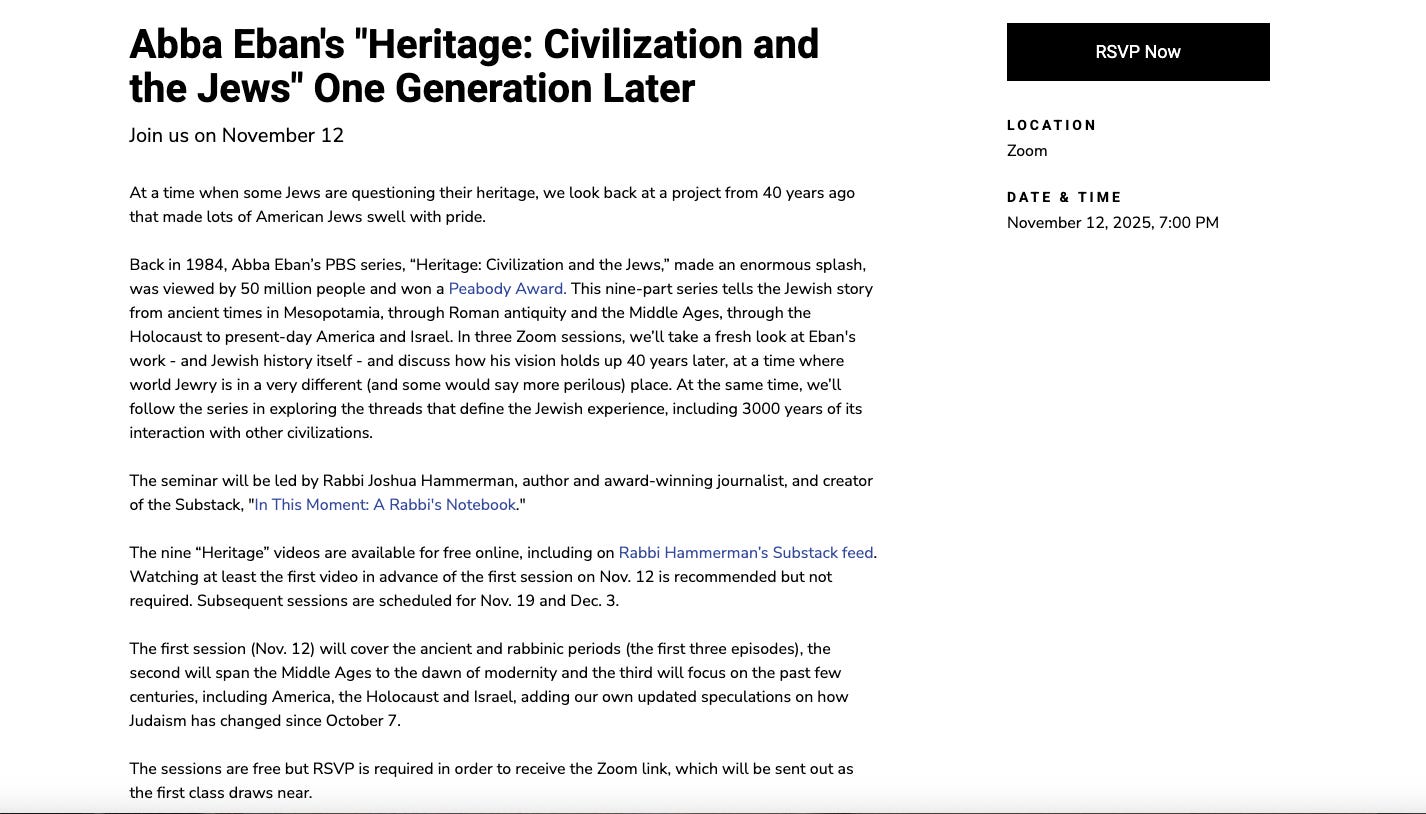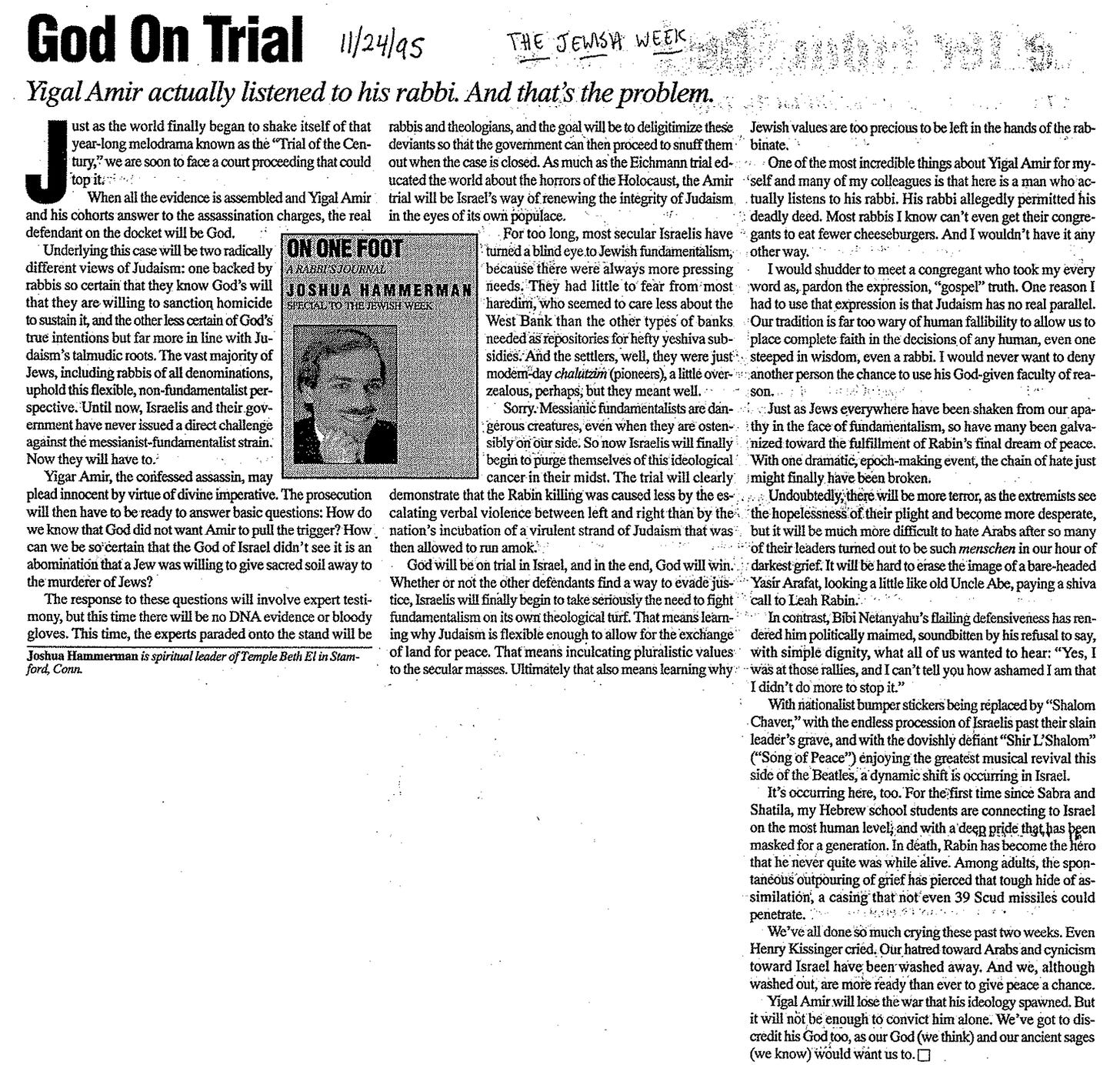This week, on November 4, we’ll recall the 30th anniversary of the murder of Israeli Prime Minister Yitzhak Rabin, which calls to mind so many questions.
If Rabin had lived, would Oslo have succeeded? Would the fragile but growing trust between mortal enemies have been nurtured rather than quashed? Would Yasir Arafat have ceased being Yasir Arafat just long enough to allow the more peaceful facts on the ground to be implanted in the minds of those Israelis and Palestinians yearning for normalcy? Would the youth of Israel, so galvanized in their grief following the murder, have been able to channel that same idealism into genuine progress, building relationships with their Arab neighbors one person at a time and forging a grassroots coexistence?
These are questions that endlessly dog us as we watch Israelis and Palestinians in the midst of yet another hopeless cycle of terror, recrimination and death.
What made Rabin such a visionary leader is that he was able to let go of the past without losing his historical perspective. There are lessons to be learned from any experience, and he had learned plenty over the course of his epic career. But he never let old resentments cloud the fact that every new day presented a gleaming blank slate of possibilities.
Though not a religious man, he embodied the spirit of the prayer Jews recite each morning, extolling God “who renews in goodness each day the work of Creation.” Every day God presses the “reset” button. Rabin was able to do this as well, like Mandela and Gandhi, Lincoln, Sadat, Martin Luther King Jr. and other visionary leaders (many of whom also met violent ends) — and unlike just about all the Israeli and Palestinian leaders who have followed him.
When he received his Nobel Prize, Rabin said, “…of all the memories I have stored up in my 72 years, I now recall the hopes. Our peoples have chosen us to give them life. Tonight, their eyes are upon us and their hearts are asking: how is the authority vested in these men and women being used? What will they decide? What kind of morning will we rise to tomorrow? A day of peace? Of war? Of laughter or of tears?”
In choosing hope, this lifelong secular Jew expressed Judaism at its best, while his supposedly religious murderer, Yigal Amir, taking instructions from his rabbi, represented a hateful strain that has only gotten stronger as the years have passed - just as messianic, extremist, distorted forms of Christian and Islamic nationalism have risen throughout the world.
Just days after the murder, I wrote of Amir’s pending trial:1
Underlying this case will be two radically different views of Judaism: one backed by rabbis so certain that they know God’s will that they are willing to sanction homicide to sustain it, and the other less certain of God’s true intentions but far more in line with Judaism’s Talmudic roots. The vast majority of Jews, including rabbis of all denominations, uphold this flexible, non-fundamentalist perspective. Until now, Israelis and their government have never issued a direct challenge against the messianist-fundamentalist strain. Now they will have to.
Rabin fought relentlessly against those who distorted Judaism so dangerously, but he was unable to suppress this malignant strain. The Rabin killing was caused less by the escalating verbal violence between left and right than by the nation’s incubation of a virulent strand of Judaism that was then allowed to run amok.
Amir’s defenders are now in the Israeli government.
I take no comfort at having been proven right about the rise of the messianic right. Now, three decades later, Israel and America are both engaged in a struggle to preserve democracy and to restore sanity - and a modicum of hope - to a shattered world. I’m still fighting the same fight and will never stop.
To gain strength, I look to Rabin.
We need to be inspired by the man who showed such courage and vision.
Rabin could have fallen back on his litany of tragic memories, of countless comrades buried, of opportunities wasted, of incessant terror and reprisal, of hatred endlessly regurgitated. He chose instead to “recall hopes,” a seeming oxymoron, to retrieve — from his past — a future-focused buoyancy that is at the very core of authentic Zionism, a hope that is its anthem’s very name, and to use it to forge a vision of astonishing promise and endless possibility. He chose hope.
And so must we.
Here’s my full article following the murder, appearing originally in The Jewish Week, November 24, 1995
God on Trial
Just as the world finally began to shake itself of that year-long melodrama known as the “Trial of the Century,” we are soon to face a court proceeding that could top it.
When all the evidence is assembled and Yigal Amir and his cohorts answer to the assassination charges, the real defendant on the docket will be God.
Underlying this case will be two radically different views of Judaism: one backed by rabbis so certain that they know God’s will that they are willing to sanction homicide to sustain it, and the other less certain of God’s true intentions but far more in line with Judaism’s talmudic roots. The vast majority of Jews, including rabbis of all denominations, uphold this flexible, non-fundamentalist perspective. Until now, Israelis and their government have never issued a direct challenge against the messianist-fundamentalist strain. Now they will have to.
Yigar Amir, the confessed assassin, may plead innocent by virtue of divine imperative. The prosecution will then have to be ready to answer basic questions: How do we know that God did not want Amir to pull the trigger? How can we be so certain that the God of Israel didn’t see it is an abomination that a Jew was willing to give sacred soil away to the murderer of Jews?
The response to these questions will involve expert testimony, but this time there will be no DNA evidence or bloody gloves. This time, the experts paraded onto the stand will be rabbis and theologians, and the goal will be to deligitimize these deviants so that the government can then proceed to snuff them out when the case is closed. As much as the Eichmann trial educated the world about the horrors of the Holocaust, the Amir trial will be Israel’s way of renewing the integrity of Judaism in the eyes of its own populace.
For too long, most secular Israelis have turned a blind eye to Jewish fundamentalism, because there were always more pressing needs. They had little to fear from most haredim, who seemed to care less about the West Bank than the other types of banks needed as repositories for hefty yeshiva subsidies. And the settlers, well, they were just modern-day chalutzim (pioneers), a little overzealous, perhaps, but they meant well.
Sorry. Messianic fundamentalists are dangerous creatures, even when they are ostensibly on our side. So now Israelis will finally begin to purge themselves of this ideological cancer in their midst. The trial will clearly demonstrate that the Rabin killing was caused less by the escalating verbal violence between left and right than by the nation’s incubation of a virulent strand of Judaism that was then allowed to run amok.
God will be on trial in Israel, and in the end, God will win. Whether or not the other defendants find a way to evade justice, Israelis will finally begin to take seriously the need to fight fundamentalism on its own theological turf. That means learning why Judaism is flexible enough to allow for the exchange of land for peace. That means inculcating pluralistic values to the secular masses. Ultimately that also means learning why Jewish values are too precious to be left in the hands of the rabbinate.
One of the most incredible things about Yigal Amir for myself and many of my colleagues is that here is a man who actually listens to his rabbi. His rabbi allegedly permitted his deadly deed. Most rabbis I know can’t even get their congregants to eat fewer cheeseburgers. And I wouldn’t have it any other way.
I would shudder to meet a congregant who took my every word as, pardon the expression, “gospel” truth. One reason I had to use that expression is that Judaism has no real parallel. Our tradition is far too wary of human fallibility to allow us to place complete faith in the decisions of any human, even one steeped in wisdom, even a rabbi. I would never want to deny another person the chance to use his God-given faculty of reason.
Just as Jews everywhere have been shaken from our apathy in the face of fundamentalism, so have many been galvanized toward the fulfillment of Rabin’s final dream of peace. With one dramatic, epoch-making event, the chain of hate just might finally have been broken.
Undoubtedly, there will be more terror, as the extremists see the hopelessness of their plight and become more desperate, but it will be much more difficult to hate Arabs after so many of their leaders turned out to be such menschen in our hour of darkest grief. It will be hard to erase the image of a bare-headed Yasir Arafat, looking a little like old Uncle Abe, paying a shiva call to Leah Rabin.
In contrast, Bibi Netanyahu’s flailing defensiveness has rendered him politically maimed, soundbitten by his refusal to say, with simple dignity, what all of us wanted to hear: “Yes, I was at those rallies, and I can’t tell you how ashamed I am that I didn’t do more to stop it.”
With nationalist bumper stickers being replaced by “Shalom Chaver,” with the endless procession of Israelis past their slain leader’s grave, and with the dovishly defiant “Shir L’Shalom” (”Song of Peace”) enjoying the greatest musical revival this side of the Beatles, a dynamic shift is occurring in Israel.
It’s occurring here, too. For the first time since Sabra and Shatila, my Hebrew school students are connecting to Israel on the most human level, and with a deep pride that has been masked for a generation. In death, Rabin has become the hero that he never quite was while alive. Among adults, the spontaneous outpouring of grief has pierced that tough hide of assimilation, a casing that not even 39 Scud missiles could penetrate.
We’ve all done so much crying these past two weeks. Even Henry Kissinger cried. Our hatred toward Arabs and cynicism toward Israel have been washed away. And we, although washed out, are more ready than ever to give peace a chance.
Yigal Amir will lose the war that his ideology spawned. But it will not be enough to convict him alone. We’ve got to discredit his God too, as our God (we think) and our ancient sages (we know) would want us to.



No comments:
Post a Comment